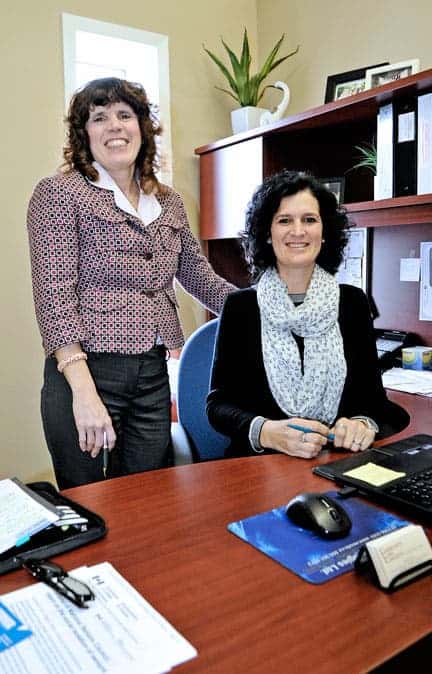With the Baby Boomer cohort aging and life expectancy on the rise, the problem of social isolation amongst seniors will become magnified, a report by the National Seniors Council says.
![Cathy Harrington and Karla Frey of Community Care Concepts are working hard to prevent social isolation amongst the townships’ senior population. Programs like the senior support worker initiative and the fall prevention and exercise classes – both launched over the last two years – have been popular ways for elderly members of the community to maintain active social lives. [Scott Barber / The Observer]](https://www.observerxtra.com/content/images/wp-content/uploads/2015/01/post_isolation.jpg)
The report, commissioned by the federal government in 2013, saw some 300 organizations and individuals across the country consulted on the growing issue.
“Social isolation is commonly defined as a low quantity and quality of contact with others,” the report states. “A situation of social isolation involves few social contacts and few social roles, as well as the absence of mutually rewarding relationships.”
With the number of seniors (persons over 65 years of age) expected to double in the next 25 years, and the trend of smaller, more geographically dispersed families, the issue is becoming more prevalent, according to the report.
“Although knowledge and data about social isolation of seniors in Canada are limited, existing findings demonstrate that many older Canadians are socially isolated or at risk of becoming so,” the report states. “In a Statistics Canada 2012 Health Report, almost one in four adults over the age of 65 (24%) reported that they would have liked to have participated in more social activities in the past year. Statistics Canada’s 2008-09 Canadian Community Health Survey found that 19 per cent of individuals aged 65 or over felt a lack of companionship, left out, or isolated from others. Also, according to a 2006 study conducted by Dr. Janice Keefe, more than 30 per cent of Canada’s seniors are at risk of social isolation.”
Here in Woolwich and Wellesley townships, experienced senior care workers are witnessing the issue firsthand.
And they’re taking action.
“When I read the report, all of those components resonated with what we see and what we’re about as an organization,” said Cathy Harrington, executive director of Community Care Concepts. “The core messages were not surprising because they are things that we see daily and they are the things that we have been trying to address through the full continuum of services we offer the community.”
Funded by the Waterloo-Wellington Local Health Integration Network, the townships, service clubs, private donors and fundraising events, CCC is able to provide a wealth of programs and services to seniors in the region, often free of charge.
And while there is a myriad of services offered to seniors by CCC and a number of other local organizations – Woolwich Community Services and the Woolwich and Wellesley Community Health Centres just to name a pair – each service is geared to ensure that seniors have the opportunity for social activities and connections.
“When we take a look at what it means to age in a healthy manner, there are all different dimensions that you can look at,” Harrington explained. “So there is the physical and mental health that people need, and certainly we have a great health care system. We know that we need good nutrition, and our meal programs and Meals on Wheels dining is a way to support the nutritional needs. We also know that physical exercise is important, and we have incorporated a popular exercise and falls prevention program. But time and time again, we also know that even if you have those components, if you don’t have a way to engage with others in a meaningful way, than all of those other things fall down.”
Social connections are fundamental to our health, but it can mean very different things for different people, Harrington added.
Some people aren’t interested in getting out into a larger crowd at a dining program or at an exercise class. Maybe, they prefer one-on-one time with a close friend or a care worker.
That’s why CCC offers everything from drop-in day programs and dinning times to the friendly visiting and lunch date programs.
The agency also initiated a social support worker program last year that provides seniors with visits, medication remainders, shopping and help with chores while also providing a bridge to the greater network of services offered in the community.
Celebrating its 30th year, CCC functions on the back of the 160 volunteers who provide some 9,000 hours of service annually.
Their dedication is “beyond amazing,” CCC community outreach director Karla Frey said, noting the incredible sense of community found in Woolwich and Wellesley townships.
The volunteers are the “eyes and ears” of the organization, she added, helping to spot red flags and make sure people have access to everything and anything they need.
This will be a big year for CCC, as the popular senior support worker and fall-prevention and exercise programs established last year continue to flourish and demand for senior care increases.
In February, a seniors’ fair will be hosted at the Breslau Community Centre. In the spring, a volunteer appreciation event will take place and in the fall, the organization plans to hold a 30th anniversary celebration.
For more information, contact Community Care Concepts at 519-664-1900.









